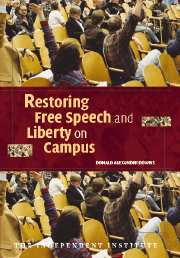Book contents
- Frontmatter
- Contents
- Acknowledgments
- Preface
- PART I INTRODUCTION AND BACKGROUND
- PART II CASE STUDIES IN THE POLITICS OF CIVIL LIBERTY ON CAMPUS
- 3 Columbia's Sexual Misconduct Policy: Civil Liberty versus Solidarity
- 4 Berkeley and the Rise of the Anti–Free Speech Movement
- 5 Undue Process at Penn
- 6 Renewal: The Rise of the Free Speech Movement at Wisconsin
- 7 Abolition in the Wisconsin Faculty Senate and Its Aftermath
- PART III CONCLUSIONS
- Appendix
- Index
4 - Berkeley and the Rise of the Anti–Free Speech Movement
Published online by Cambridge University Press: 12 July 2009
- Frontmatter
- Contents
- Acknowledgments
- Preface
- PART I INTRODUCTION AND BACKGROUND
- PART II CASE STUDIES IN THE POLITICS OF CIVIL LIBERTY ON CAMPUS
- 3 Columbia's Sexual Misconduct Policy: Civil Liberty versus Solidarity
- 4 Berkeley and the Rise of the Anti–Free Speech Movement
- 5 Undue Process at Penn
- 6 Renewal: The Rise of the Free Speech Movement at Wisconsin
- 7 Abolition in the Wisconsin Faculty Senate and Its Aftermath
- PART III CONCLUSIONS
- Appendix
- Index
Summary
As seen in Chapter 1, the Berkeley campus teems with student groups. In this sense, the legacy of the free speech movement is alive and well. But the variety and vibrancy of the many student groups belie the actual state of free speech at Berkeley. Based on a variety of data and interviews with over thirty professors and politically prominent students, I came to some conclusions about the status of free speech on campus. First, with some exceptions I address later, basic academic freedom thrives in the classroom. Second, the administration has not engaged in progressive censorship; indeed, Berkeley has remained surprisingly free of speech code conflicts. Third, the real threat to free speech that has arisen takes the form of “progressive social censorship” in the public forum – meaning pressure from individuals or groups outside of government or official institutions in the name of progressive causes, such as the shouting down of speakers, intimidation, threats, the theft of publications, and even burglary. Every person I interviewed agreed with this assessment. Fourth, until 2002, neither the administration nor the faculty had made any meaningful effort to safeguard free speech in the public forum. No political organization promoting free speech exists.
With the exception of those in the Law School, and of a few incidents I discuss, no students I interviewed recalled any significant restriction of free speech in the classroom. Overall, professors were conscientious about fostering a climate that supported free intellectual dialogue.
- Type
- Chapter
- Information
- Restoring Free Speech and Liberty on Campus , pp. 107 - 153Publisher: Cambridge University PressPrint publication year: 2004



